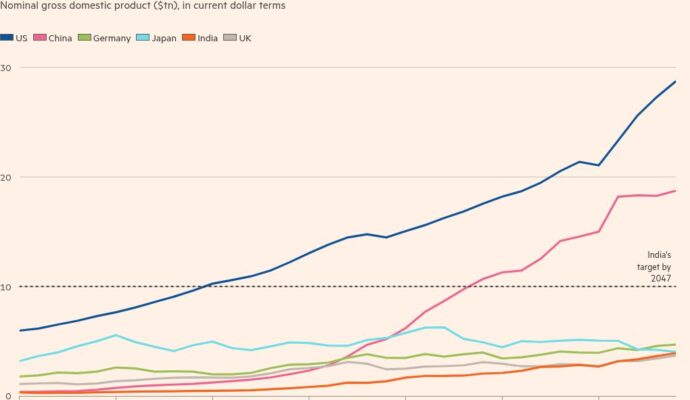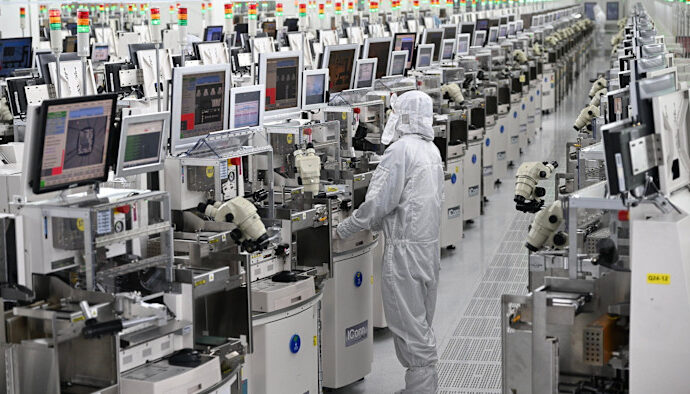Chinese drugmakers have struck a record number of deals this year to sell their assets overseas, sending biotech stocks surging as investors bet the country will become a driving force in global drug discovery.
There have been 93 overseas licensing deals in the first eight months of 2025, worth a combined $85bn, according to Chinese data provider PharmCube — with domestic companies selling the international rights to homegrown drugs. The total value of deals is on track to hit its sixth consecutive annual record, underscoring the speed at which the country’s pharmaceutical sector is internationalising.
Meanwhile, the rapid growth of clinical trials and drugs in early-stage development from companies, including Jiangsu Hengrui and Akeso, indicates that the trend of Chinese biotechs selling their drugs to global pharmaceutical companies is set to continue — a stark reversal from a decade ago.
“Ten years ago, China didn’t have a biotech sector to speak of. For the most part, the companies were developing generic drugs. Fast forward to today, and every big pharma is doing most of their shopping in China for novel therapies,” said Brad Loncar, an expert on Chinese biotech.
Beijing introduced reforms in the mid-2010s that made it easier for biotech companies to raise capital and pursue innovation. These changes, coupled with the relative speed and low cost of doing drug development and clinical trials, have turbocharged the industry’s growth. Hong Kong’s Hang Seng biotech index has surged more than 80 per cent this year on growing investor excitement.
Jiangsu Hengrui
China’s transformation from a copycat manufacturer of drugs developed overseas to a hub of homegrown research is exemplified by Jiangsu Hengrui. Founded in 1970, it spent the first two decades as a small-scale state-owned manufacturer of low-cost antiseptics. In the 1990s, it started developing generic anti-cancer drugs. It was privatised in 1997 and began investing in building its own research capabilities. Today, it has one of the most diversified pipelines in the country, spanning weight-loss therapies, oncology drugs and Alzheimer’s treatments.
Tony Ren, Head of Asia Healthcare Research at Macquarie Capital, said Hengrui was “a bellwether” for China’s pharmaceutical industry.
“The company offers a rare combination of proven R&D processes, a number of global outlicensing deals, China-centric sales skills, professional management and sound corporate governance,” he said.
Hengrui has struck licensing agreements with Merck, Braveheart Bio and Glenmark in the past year alone. In July, it agreed a deal with UK pharmaceutical company GSK to develop up to 12 medicines.
“In China, you can scale and test medicines in human beings much faster than in the US or Europe,” said Loncar. “If you have an idea for a drug, you can get an answer about whether it works a year or two earlier in China.”
For many Chinese biotechs, the surge in international partnerships has provided much-needed capital after a difficult few years marked by drug pricing reforms that squeezed profit margins on domestic sales.
Zhao Bing, a pharmaceutical analyst at Huajing Securities, said that Chinese biotechs can be vulnerable to fluctuations in revenue from licensing agreements, which are tied to achieving specific milestones in clinical trials while also funding much of their growing research and development spending.
Hengrui’s international deals have highlighted a concern for Chinese pharma companies seeking to get international approval for new drugs. The US Food and Drug Administration has repeatedly rejected one of Hengrui’s cancer drugs, citing questions about quality control at its manufacturing sites.
Akeso
Guangdong-based Akeso has captured investor attention for its advances in oncology. Ren described the company as “very good at drug discovery and clinical execution”.
Akeso’s lead therapy, ivonescimab, has been greeted with a mix of enthusiasm and scepticism. The bispecific antibody, which targets two cancer pathways, was approved in China last year — the first therapy of its kind to reach the market — sending its shares up more than 90 per cent in 2025. It was initially approved for use in patients with lung cancer who had already undergone treatment, but its application has since been expanded.
In Chinese trials, ivonescimab outperformed Merck’s Keytruda, the world’s best-selling cancer drug, in preventing tumour progression. “There’s a bull-bear debate between people who believe the Chinese data,” said Loncar. “The potential value of this drug is exponential if it is better than the greatest cancer drug of all time.”
However, in a recent global Phase 3 trial, the therapy failed to replicate those results among North American and European patients, with their cancers returning and advancing faster than in Chinese studies. Analysts say it is too early to judge the drug’s global prospects, as Akeso expands testing for other cancers, including colorectal.
While ivonescimab remains the company’s key drug, Akeso also has a broad pipeline across oncology, autoimmune and metabolic diseases. Analysts highlight its growing focus on antibody-drug conjugates (ADCs) — these deliver targeted chemotherapy directly to cancer cells, minimising damage to healthy tissue.
ADCs have become a focus for China’s biotech sector, playing to its strengths in large-scale lab experimentation. “Developing ADCs involves huge amounts of trial and error,” said Zhao. “It’s an engineering problem — and China has a surplus of engineers.”
Legend Biotech
Legend Biotech is based in New Jersey, but has its roots in China and its biggest shareholder remains China-based GenScript. Legend is among China’s leading gene therapy developers. It rose to prominence after a 2017 partnership with Johnson & Johnson to develop a CAR-T therapy for multiple myeloma, a type of blood cancer. The landmark deal came in for some criticism at the time as a risky bet on China’s then nascent biotech industry, but it helped to spark the current wave of licensing deals.
While US groups have poured resources into gene therapy, many have been held back by soaring costs and regulatory hurdles in their home market. In China, by contrast, regulators have supported the field by allowing earlier human trials and more flexibility in how they are designed.
Legend’s Carvykti therapy with J&J — which aims to re-engineer a patient’s immune cells to target and destroy cancer — was approved last year in China for patients with myeloma that had recurred after previous treatments.
But while Chinese regulators have nurtured innovation, low domestic drug prices have forced companies to look abroad to recoup investment. “One huge disappointment has been that the commercial sales for China’s drug sector have never bloomed,” said Loncar.
“It has some of the lowest prices for drugs in the world. Nearly all of the success of these companies — and their booming stock prices — hinges on their ability to succeed in the US.”
Additional reporting by Xueqiao Wang in Shanghai and Patrick Temple-West in New York




